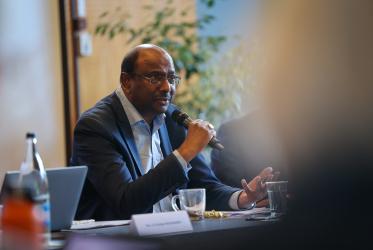A century after the landmark Paris Peace Conference that followed the First World War, representatives of churches from throughout Europe gathered in the French capital to seek ways of strengthening peace in the 21st century.
“We will explore the Paris Peace Conference of 1919 in its centenary year, will identify its legacies and will learn some hard lessons from our European and global past,” said Rev. Christian Krieger, president of the Conference of European Churches, which organized the 10-12 September event in Paris to mark its 60th anniversary.
“We hope that we will draw inspiration from the role and work of the Conference of European Churches, since its creation, as an ecumenical instrument engaged with peacebuilding, healing of memories and reconciliation,” he said in an address opening the meeting.
At the time the Conference of European Churches was founded in 1959, the European continent was fragmented and divided, and there was a need to overcome political divisions and work for healing and peace, said Krieger.
In a lecture to the more than 60 participants from the Conference of European Churches member churches and related organizations, Dr Johnston McMaster of the Irish School of Ecumenics in Dublin recalled how the proceedings of the 1919 Paris Peace Conference were dominated by four countries – France, Italy, the United Kingdom, and the United States.
“An elite set about deciding the shaping of a new world order in their own image,” said McMaster.
Legacies of the Paris conference
The conference is best known for the Treaty of Versailles, which imposed reparations on Germany, holding it responsible for starting the First World War, enforced territorial concessions on Germany, and removed its overseas colonies.
The legacies of the Paris conference, McMaster said, included the creation of the League of Nations, which was succeeded by the United Nations after the Second World War, the partitioning of the Middle East between Britain and France, a “betrayal of China” that was a factor in the Communist revolution there, and a refusal to countenance racial equality.
“They never took Africa and Asia seriously,” said McMaster of the main protagonists of the 1919 conference. “There was an inherent belief in white supremacy.”
Greeting participants, Metropolitan Emmanuel, the acting president of the Council of Christian Churches in France, referred to the results of the 1919 conference.
“In reality, the humiliation of those who lost the war led to the preparation of World War Two,” said Metropolitan Emmanuel, acting president of the Council of Christian Churches in France. There was now a need to work for a safe and peaceful future.
Promoting reconciliation
The opening ceremony of the conference on 10 September was addressed by Claudia Roth, vice-president of the German Bundestag, and Sylvain Waserman, vice-president of the French National Assembly.
They each recalled how their countries had been at war with each other twice in the 20th century, and how since the end of the Second World War it had been possible to promote reconciliation between the two nations.
“If we want to understand the present, if we want to shape the future, we need to confront the past,” said Roth. “Let us accept our mandate to create a more peaceful world.”
Waserman underlined that religious institutions have a role to play in promoting peace.
“The European Union is suffering from a rise of nationalism and populism,” he said. “On these issues, religions have a role to play.”
The Conference of European Churches brings together 114 churches from Orthodox, Protestant, Anglican and Old Catholic traditions from all over Europe for dialogue, advocacy and joint action.








